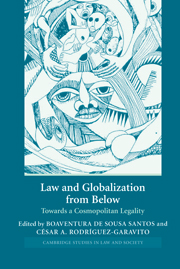Book contents
- Frontmatter
- Contents
- Notes on the contributors
- 1 Law, politics, and the subaltern in counter-hegemonic globalization
- PART ONE LAW AND THE CONSTRUCTION OF A GLOBAL ECONOMY OF SOLIDARITY
- 2 Beyond neoliberal governance: the World Social Forum as subaltern cosmopolitan politics and legality
- 3 Nike's law: the anti-sweatshop movement, transnational corporations, and the struggle over international labor rights in the Americas
- 4 Corporate social responsibility: a case of hegemony and counter-hegemony
- 5 Campaigning for life: building a new transnational solidarity in the face of HIV/AIDS and TRIPS
- 6 Negotiating informality within formality: land and housing in the Texas colonias
- 7 Local contact points at global divides: labor rights and immigrant rights as sites for cosmopolitan legality
- PART TWO TRANSNATIONAL SOCIAL MOVEMENTS AND THE RECONSTRUCTION OF HUMAN RIGHTS
- PART THREE LAW AND PARTICIPATORY DEMOCRACY: BETWEEN THE LOCAL AND THE GLOBAL
- Index
- References
6 - Negotiating informality within formality: land and housing in the Texas colonias
Published online by Cambridge University Press: 07 July 2009
- Frontmatter
- Contents
- Notes on the contributors
- 1 Law, politics, and the subaltern in counter-hegemonic globalization
- PART ONE LAW AND THE CONSTRUCTION OF A GLOBAL ECONOMY OF SOLIDARITY
- 2 Beyond neoliberal governance: the World Social Forum as subaltern cosmopolitan politics and legality
- 3 Nike's law: the anti-sweatshop movement, transnational corporations, and the struggle over international labor rights in the Americas
- 4 Corporate social responsibility: a case of hegemony and counter-hegemony
- 5 Campaigning for life: building a new transnational solidarity in the face of HIV/AIDS and TRIPS
- 6 Negotiating informality within formality: land and housing in the Texas colonias
- 7 Local contact points at global divides: labor rights and immigrant rights as sites for cosmopolitan legality
- PART TWO TRANSNATIONAL SOCIAL MOVEMENTS AND THE RECONSTRUCTION OF HUMAN RIGHTS
- PART THREE LAW AND PARTICIPATORY DEMOCRACY: BETWEEN THE LOCAL AND THE GLOBAL
- Index
- References
Summary
INTRODUCTION
Among the manifest expressions of the amorphous phenomenon called “globalization” is the intensification and spread of informality in many social and economic practices. Long recognized and studied in the developing world, informality is increasingly visible inside the United States. Most studies of informality inside the United States have focused on labor, production, and distribution, examining sweatshops, home piecework manufacture, or street vendors. Informal housing is hardly recognized as existing in this country, and certainly is not included in state policy as a legitimate means of housing production. Whether the subject is informal labor or informal housing, nowhere in the United States has the formal legal system crafted a coherent, much less productive, policy toward the departures from regulation that define informal economic activity.
Yet, within the Texas stretch of the United States–Mexico borderlands, more than half a million people now live in settlements of informal housing known regionally as “colonias.” Although there are colonia-type settlements in other border states of the United States, the vast majority of such settlements inside the country are found in Texas (LBJ School 1997:1).
In this region, the word “colonia” refers to a semi-rural subdivision of substandard housing that lacks some or all basic physical infrastructure and public services, in particular, clean water, sanitary sewage, or adequate roads. (This is a regional usage of the word “colonia.” In Spanish, the word means simply “neighborhood.”) This chapter focuses on informal housing settlements in Texas.
Information
- Type
- Chapter
- Information
- Law and Globalization from BelowTowards a Cosmopolitan Legality, pp. 140 - 157Publisher: Cambridge University PressPrint publication year: 2005
References
Accessibility standard: Unknown
- 4
- Cited by
